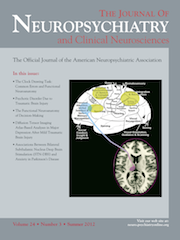Psychotic Disorder Due to Traumatic Brain Injury: Analysis of Case Studies in the Literature
Abstract
The present study utilized methodology from a previous descriptive study that analyzed case studies of psychotic disorder due to traumatic brain injury (PD-TBI) reported in psychiatry and neurology journals. The purpose was to replicate findings from the PD-TBI literature and to elucidate a pattern of characteristics that would differentiate PD-TBI from schizophrenia. The findings supported both objectives. PD-TBI data were highly consistent with previous studies: PD-TBI differed from schizophrenia in showing more focal frontal and temporal abnormalities on neurological studies and a lower rate of negative symptoms. The authors discuss implications of these findings for conceptualizing psychosis as a neurobiological syndrome.



